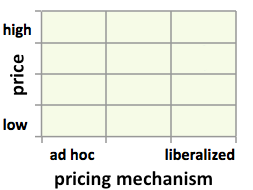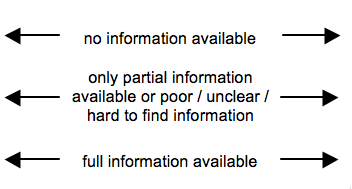Fuel Prices Congo
Part of: GIZ International Fuel Price database
Fuel Pricing Policies
| Local Currency: | XAF |
| Exchange Rate: | 468.95
|
| Last Update: |
Until 2002, only national companies were actors in the petroleum downstream sector. In 2002, the entry into those markets (particularly storage, transportation, distribution and marketing) was liberalized to private companies, as Total, Texaco and others (→App. A1).
The “Agence de Régulacion de l’Aval Pétrolier” (ARAP) is the national regulation authority for fuels. The ARAP calculates real ceiling fuel prices monthly and gives this information to the government. The government then defines fixed prices for fuels, which are geared to those real costs calculated by ARAP. However, the fixed prices do not necessarily change monthly, depending on the volatility of the real costs. Whenever the fixed price is lower than the real price, fuels are subsidized intentionally; otherwise, there is taxation on fuel. (→App. A2, A4) Up-to-date information is missing; any information available is from early 2007 or older.
The only refinery company, CORAF, is a national company. Their only refinery produces most of retail fuel products for Congo. Due to a transportation bottleneck between the coast and the inland (using rail and streets as well), the inland regions, particularly Brazzaville, often face fuel shortages (→App. A4). Because of national subsidies, prices on Congo are lower than in neighboring countries, leading to smuggling and black markets (→App. A4).
Congo is an exporter of crude oil. 95% of the hauled crude oil is exported (→App. A3).
Fuel Prices and Trends
| Gasoline 95 Octane | Diesel | |
|---|---|---|
| in USD* |
|
|
| in Local Currency |
|
|
* benchmark lines: green=US price; grey=price in Spain; red=price of Crude Oil
Fuel Price Composition
Price composition.
There is no up-to-date information available concerning fuel price composition.
According to →App. A4, the actual price of fuel is calculated as the sum of refinery price, transportation costs, margins and corporate taxes. Since pump prices are fixed, there is always some difference to the calculated price, leading to taxation or subsidy.
At a Glance
| Regulation-Price-Matrix |
| ||||
 |

|

|

| ||
All information available online is out-of-date and presented unclear. An exact definition of how real prices are calculated is missing. It is also unclear, how the government sets prices based on those real prices.
Sources to the Public
| Type of Information | Web-Link / Source |
|---|---|
| Other Information | http://arapcongo.olympe-network.com/ (ARAP Website) |
| Other Information | http://www.mefb-cg.org/petroles/transp_gest_petroliere.html (Ministry of Economy) |
| Price Composition | http://arapcongo.olympe-network.com/information-interview.htm (Only poor information available) |
| Pricing Mechanism | http://arapcongo.olympe-network.com/information-mecanisme.htm |
| Pump prices and margins | http://arapcongo.olympe-network.com/activite_dist&com.htm (Old Values) |
Contact
Please find more information on GIZ International Fuel Price Database and http://www.giz.de/fuelprices



















